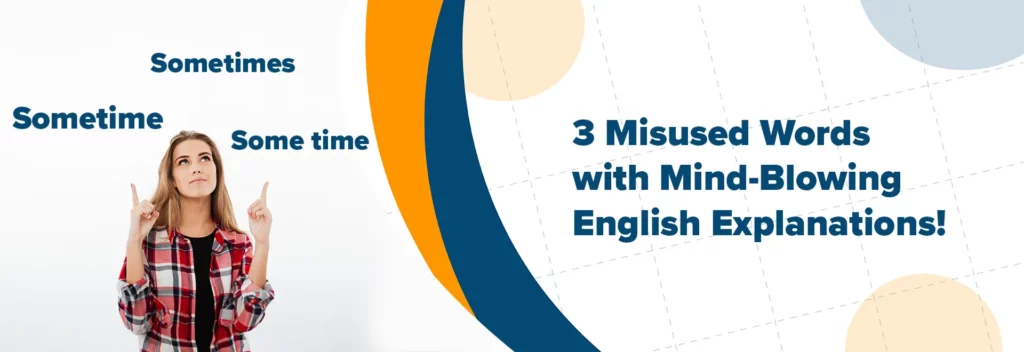
Sometime, Some time, Sometimes: 3 Misused Words with Mind-Blowing English Explanations!
Introduction
“Sam sometimes remembers sometime in the past as a sometime crew at McDonald’s for quite some time.”
Quite confusing? Exactly! It is because they sound alike, however, they have different purposes and functions in a sentence. To solve this confusion, QQEnglish is here to provide you with in-depth knowledge about this. just keep on reading and you will learn something worthwhile.
Some words are spelled alike but vary in meaning. These words are also known as Homonyms —words that have the same pronunciation and spelling but have different meanings, functions, and origins. It may be quite confusing, and even native English speakers commit mistakes when using these terms. They might overlook its spelling but need to remember the exact meaning. However, nobody is perfect. We unconsciously make mistakes, especially when it comes to the English language.
According to S. Kumphee in his study conducted in 2015 at Suranaree University of Technology, he says that committing grammatical errors in writing is one of the major predicaments for English as a Second Language (ESL) and English as a Foreign Language (EFL) students. The researcher also added that the mother tongue language of the students became a factor in the aforesaid problem.
In addition, homonym comprehension is one of the factors affecting the wrong usage of words. According to Hoffman & Tamm, 2020, even native and second language learners have almost the same problem and context-dependent coding in the semantic system functions of our brain as to how we process these complexities from homonyms. However, both of them can achieve disambiguation said Elston-Güttler & Friederici, in their study in 2007.
Nonetheless, these terminologies: sometime, some time, and sometimes, are the most commonly misused words in English. It’s like a newborn triplet. They may have identical features but they have differences as well and distinct purposes in their own unique ways.
Misused Words: Differences and Examples of Sometime, Some time, and Sometimes
They have similar sounds but they have different meanings and uses in a sentence. That is why we must be wary of its purposes in a sentence. These three: sometime, some time, and sometimes fall into different categories. With this, let us further differentiate the aforesaid misused words and provide examples of each.
Sometime¹
This word is considered an adverb of time, wherein, it talks about an unspecified point of time in the future or at some point. We use this word if we want to make some plans ahead of time, future activities, and other future errands without specifying a time in the future. It is usually paired with the word “soon” after it.
Examples:
1. “Let’s meet again sometime.”
Explanation: This sentence tells us that Person A is asking Person B to meet again soon but no exact time is mentioned.
2. “Come and revisit us sometime next month.”
Explanation: Person A here is requesting Person B to revisit them next month but it could be either in February, March, December, etc. as long as it’s next month.
3. “I’ll enroll in Fine Arts sometime this spring season!”
Explanation: This sentence entails that the person can enroll probably next year or next, as long as it falls to the Spring season.
4. “Sometime soon in January, we’ll get married.”
Explanation: The man assures the woman that they are going to get married in January regardless of what specific year in the future.
5. “Let’s have a dinner date at 7:00 p.m. sometime soon.”
Explanation: This sentence talks about a boy who invited a girl to have dinner with him at 7:00 p.m. but without a specific date as to when time permits them to be
Conversation:
Andrei: Hello there, Ash! It was nice meeting you.
Ash: Thanks! Me, too.
Andrei: Let’s have a picnic sometime in the summer!
Ash: Great idea. How about in the park?
Andrei: Sure! That’s awesome. See you sometime in the summer!
Ash: Yeah, sometime soon!

Explanation: This conversation uses “sometime,” meaning they are having a plan to have a picnic at the park in the summer season. However, it is not stated to which year they are referring, yet they are sure that they are going to make it happen in the future.
Sometime²
It can also be used as an adjective, which means it can describe a noun. In this case, it is just the other word for “former” or “previous.” We use this word to talk about an old character, a previous job, something one gets used to doing, and the like, but it is no longer a fact in the present.
Examples:
1. “Danny, a sometime waiter at McDonald’s, works as a pilot now.”
Explanation: This means that Danny’s previous job was as a waiter at McDonald’s before he became a licensed pilot.
2. “Keith, a sometime bully in high school, became a priest 20 years later.”
Explanation: This sentence tells that Keith who is known for being a bully in high school when he was young became a priest when he got older. For a cause that such a turning point happened in his life that made him change.
3. “He is an engineer, a sometime famous carpenter in the town.”
Explanation: This one entails that before he became an engineer, he was once a famous carpenter in his town.
4. “Agatha, who was a sometime supervisor, is our CEO now!”
Explanation: The sentence tells that Agatha, who was a supervisor, became the CEO of the company as she is the daughter of the late CEO or she got promoted to a higher position.
5. “The famous writer, a sometime science teacher, received a platinum award.”
Explanation: Before she got a platinum award for her writing skills which made her known, she was a science teacher then.

Conversation:
Sam: Hello there, I have good news for you!
Troy: What is it?
Sam: Did you remember Alex? A sometime bully in high school?
Troy: Yes! What happened?
Sam: He is a well-mannered seaman now and has changed a lot.
Troy: Oh! I see. Tiffany, his ex-girlfriend, a sometime saleslady, is a model now, too!
Sam: Really? What a glow-up, man!
Explanation: The conversation uses the other word “sometime” which means “former.” Thus, they are talking about Alex’s character —a bully then, but a well-mannered seaman now— and Tiffany’s old job —a saleslady then, but a model now.
Some Time
This is a two-word expression used to talk about a “period of time” or a longer duration. We don’t know how long the action takes place but we know it takes a long time. It is also similar to the “for a while” phrase. We use this expression to indicate a span of time in the past, present, and future. This also entails uncertainty of the length of time being stated.
Examples:
1. “I think I have some time tomorrow morning.”
Explanation: This sentence tells us that he has plenty of time tomorrow in the morning but is not sure how long it will be.
2. “It took me some time to learn English.”
Explanation: The speaker says he didn’t learn English overnight. It took years, perhaps, to be able to speak it.
3. “It will take some time to wait for the supermarket to open.”
Explanation: The customer arrived too early at the supermarket.
4. “Tiara took some time to cry after dinner.”
Explanation: Tiara stayed in her room crying for a while.
5. “The athlete takes some time to relax after the game.”
Explanation: After a tiring game the athlete relaxes for a while but does not state how long he has been relaxing.
Conversation:
Zack: Hey, Joe! What are your plans for this weekend?
Joe: I am going to take some time walking on the beach. How about you?
Zack: Well, I was going to take some time to relax after having exercises this morning.
Joe: Are you free next Sunday?
Zack: Yes! I have some time on Sunday next week.
Joe: Then, let’s have some time watching a movie together.
Zack: Good idea!

Explanation: This conversation has the phrase “some time” which means they are talking about a length of time. Although it is not stated how long it was, for they are uncertain, surely their free time is longer than a minute.
Sometimes
This word is an Adverb of Frequency used with a present simple verb tense but neither as often as always nor as rarely as never, just in between. It is fifty percent (50%), otherwise, it is the other way around. We use this adverb to express how occasionally we do things at some point. Some of the Adverbs of Frequency are always, usually, seldom, rarely, never, and many more. Moreover, this word can be placed either way at the beginning, middle, and ending of the sentence, without changing its main idea.
Examples:
1. “Sometimes, Jane forgets to bring her wallet.”
Explanation: This sentence follows the beginning format, wherein ‘sometimes’ is placed as the first word in the sentence and is always followed by a comma. Moreover, it means that Jane most of the time forgets to bring her wallet when she wants to go out.
2. “Ericka sometimes gets to school late.”
Explanation: This sentence uses the middle format of the adverb placements, which is IN the sentence now. This also means that every week, there are chances that she’ll be late i.e. She’s going to be late on Mondays and Tuesdays due to traffic.
3. “Margarette drinks beer sometimes.”
Explanation: Notice that the word ‘sometimes’ is in the last part of the sentence as it follows the ending of the adverb placement pattern. This means that Margarette drinks beer on Saturdays or twice a month.
4. “Julia and Beth sometimes fight over a boy.”
Explanation: This one follows the middle pattern and it entails that Julia and Beth’s reason for their conflict is about a boy they had a crush on.
5. “She’s intelligent but quite arrogant sometimes.”
Explanation: The word ‘sometimes’ appears in the last part of the sentence because it follows the ending pattern. It also means that this girl is truly intelligent but there are times that she’s overly confident to the point that she will look down on others.

Conversation:
Bruce: Hello, Will! How’s life going?
Will: It’s fine but quite hard sometimes. How about you?
Bruce: Lee and I sometimes go to Disneyland and travel to different places.
Will: Oh! That’s wonderful. Sometimes, I envy you both.
Bruce: Why is that so?
Will: Well, Liam and I are separated now. We can’t travel together anymore.
Bruce: Too bad. Oh! You can get along with us sometimes.
Will: Thanks a lot!
Explanation: They are talking about how often things have happened in the past, are still happening in the present, and will happen to them in the future. As you can see, the word sometimes appears in three different placements but the thought is still the same.
Key Takeaways!
Choosing the right words in making sentences can create a good impact on communication. Especially, when it comes to words that have the same spelling or almost but vary in meanings like the commonly misused words: sometime, some time, and sometimes, which is our main topic. With this, it is important to be mindful of how to use words with similar spellings well and accurately to avoid confusion and misunderstanding.




